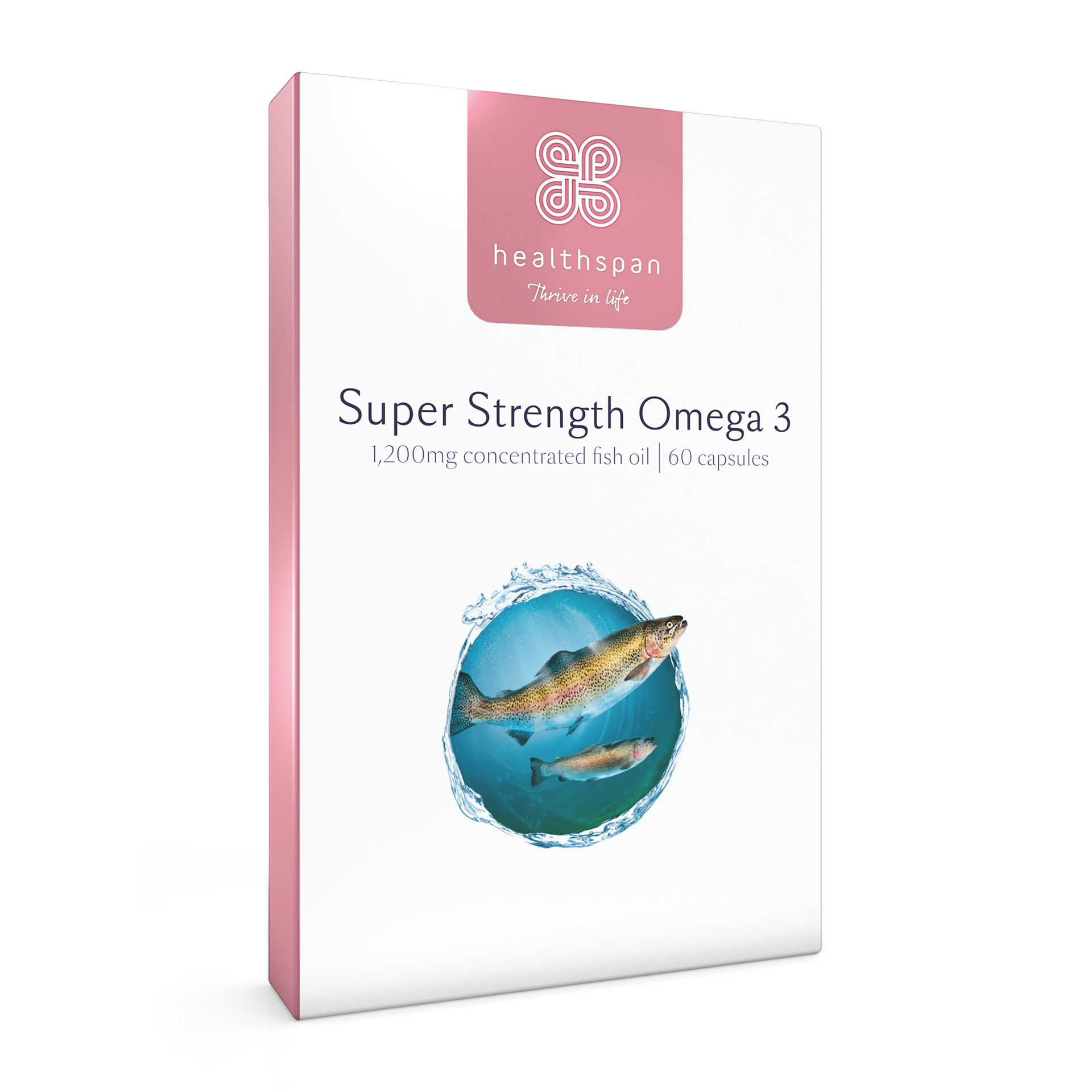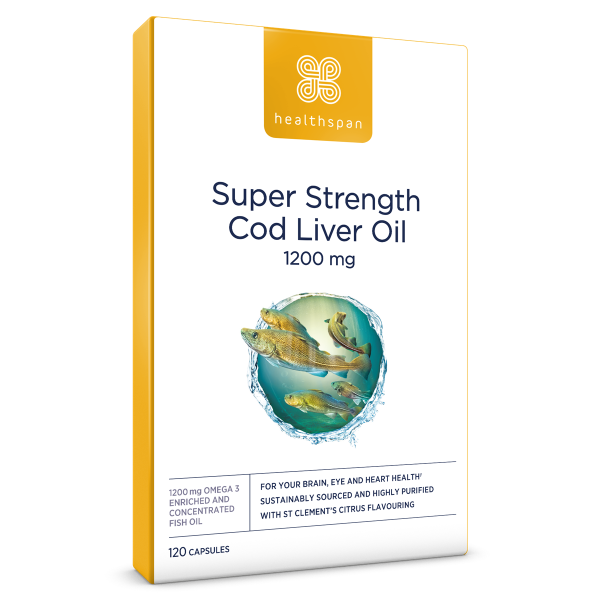There's plenty of evidence that omega 3 oils are beneficial to health, but is cod liver oil an even better choice? Jane Collins looks at the evidence.
🕒 8 min read
What are omega 3s?
Omega 3s are a type of unsaturated 'healthy' fat, which have been shown to play a role in preventing and reducing the symptoms of a range of health conditions. They are generally derived from fatty or oily fish such as mackerel, trout, herrings, salmon and sardines. Cod liver oil is a source of omega 3s, and comes from the vitamin-rich livers of Atlantic cod.
Both omega 3 oils and cod liver oil contain beneficial levels of 'essential' fatty acids. The essential label means that our bodies don't produce them naturally, so they need to come from food or supplements. Two particularly important fatty acids are docosahexaenoic acid (DHA) and eicosapentaenoic acid (EPA).
DHA contributes to supporting healthy vision and brain function, and in combination with EPA helps to maintain healthy heart function. Although both cod liver oil and omega 3 oil have similar benefits and contain omega 3 fats, the main difference between cod liver oil and omega 3 oils is that cod liver oil also contains vitamins A and D.
It should be pointed out that not all omega 3s are derived from fish. You can find these fatty acids in plant-based foods such as flaxseeds, walnuts and chia seeds, but this is a different kind known as alpha linolenic acid (ALA). The body can convert ALA into DHA and EPA, although we don't appear to absorb quite as much as we would from a marine source.
Vegans and vegetarians can also obtain omega 3s from algae-based supplements – the EPA and DHA fatty acids found in fish come originally from micro-algae.
The health benefits of omega 3s
Omega 3 fatty acids have been shown to support the health of the heart, brain, eyes and joints. When it comes to your heart, EPA and DHA have been shown to reduce triglycerides, a type of fat in the blood linked to an increased risk of heart attack and stroke; reduce the risk of developing an irregular heart beat (arrhythmia); and slow down the build-up of plaque that can harden and block your arteries. There is also evidence that they can slightly reduce blood pressure.
Brain health
Omega 3s are vital for the development of the brain at all stages of life. Not least, they appear to reduce inflammation and oxidative stress in the brain – conditions that are linked to the development of dementia and Alzheimer's. In older adults, lower levels of DHA have been linked to decreased brain size – a sign of accelerated brain ageing.
There are also studies to show that omega 3s can help with mild memory loss. One study, involving 485 older adults with age-related cognitive decline who were given either 900g of DHA daily for 24 weeks or a placebo, found that the DHA group performed better on memory and learning tests than the placebo group.
However, research on healthy people with normal brain function does not show any particular improvements in cognitive health or ability after taking fish oils.
Eye health
There is evidence that consuming omega 3-rich fish can help keep your eyes healthy – reducing the risk of macular degeneration (a progressive disease affecting the retina and the leading cause of visual impairment in the elderly) and taking omega 3 supplements can be beneficial for people with glaucoma (a condition where the optic nerve becomes damaged, causing vision disturbances).
Fish oil supplements can also help dry eyes – one study showed significant benefits after taking omega 3 capsules twice daily for six months.

Super Strength Omega 3 1,200mg
Highly concentrated, refined and sustainably sourced omega 3 fatty acids
- 240mg DHA and 360mg EPA
- Anti-inflammatory; supports brain, eye and heart health
- Benefits of oily fish
The health benefits of cod liver oil
Like regular fish oil, cod liver oil is high in omega 3 fatty acids, but as cod liver oil also contains vitamins A and D it is potentially more beneficial for certain conditions. For example, as one of the best food sources of vitamin D, cod liver oil can help provide an important nutrient for regulating calcium absorption and maintaining healthy bones.
There is also evidence to suggest that cod liver oil can reduce the symptoms of rheumatoid arthritis (RA), including joint stiffness and swelling. In one small study researchers tested whether taking 10g of cod liver oil daily could help reduce the pain of RA enough for sufferers to reduce their anti-inflammatory medication. After nine months, 39% of those who took cod liver oil had reduced their anti-inflammatory medication by 30%.
Vitamin A for eyes
There is evidence to suggest that people who eat a diet rich in vitamin A (good sources include liver, fish, eggs, dairy products and vegetables such as carrots, squash and sweet potatoes) have a reduced risk of glaucoma and AMD compared to those who have low levels of this nutrient.
It should be stressed, however, that although vitamin A is recommended for good eye health, immunity and healthy skin, you should not take it in high doses (and this can happen inadvertently if you are taking a range of different supplements that may contain vitamin A, or if you are regularly eating vitamin A-rich food sources such as liver and eggs) as it can potentially cause vitamin A toxicity.
The omega 3 fatty acids in cod liver oil have also been shown to reduce inflammation and reduce symptoms of anxiety and depression. One study involving over 21,000 people found that those who regularly took cod liver oil were less likely to have symptoms of depression and/or anxiety. It's not entirely clear why this is, but it is theorised that vitamin D can bind to receptors in the brain and stimulate the release of mood-regulating and stabilising hormones like serotonin.
How to get omega 3s from your diet
You can get the omega 3s you need from your diet by eating the recommended two servings of fish a week (of which at least one should be from oily or fatty fish). However, if fish is not a regular part of your diet taking a fish oil supplement is a simple way to ensure you are getting the necessary nutrients.
If you are vegan or vegetarian include good sources of fatty acids in your diet such as chia seeds, flax seeds, nuts (particularly walnuts) and soybeans (edamame), or take a plant-based omega 3 supplement to make sure you are getting enough beneficial EPA and DHA.
Is it better to take cod liver oil or omega 3 oil – or both?
It is recommended that you take either cod liver oil or omega 3 oil – not both. If you need extra vitamins A and D and are able to eat fish, take the cod liver oil. Be aware that those who are pregnant or trying to get pregnant should not take cod liver oil due to its vitamin A content. If you are already taking vitamin A or D – or are eating enough vitamin A-rich food – take an omega 3 supplement instead.
What should you look for in a supplement?
Omega 3 and cod liver oil supplements are available in capsule, tablet, gummy and liquid forms, and how you choose to take it is entirely down to personal preference. There are also high-strength varieties containing higher levels of beneficial fatty acids DHA and EPA (up to 360mg of EPA and 240mg DHA per capsule).
You may prefer to take cod liver oil in a capsule if you don't like the fishy taste, but many liquids contain citrus flavourings to help mask this. You can also find omega 3 oils with added extras including joint-friendly glucosamine and turmeric.
Whichever form you choose, try to make sure the ingredients have been sustainably sourced by looking for a Friend of the Sea or Marine Steward Council accreditation. Vegans and vegetarians can take flaxseed oil supplements or a vegan-friendly omega 3 sourced from algae.

Super Strength Cod Liver Oil 1,200mg
One of the highest strength cod liver oil supplements available
- Rich source of DHA and EPA
- Supports heart, brain and eye health
- Added calcium to support bone health
How much omega 3 should you take?
There is no official recommended level, but it is suggested that up to 3 mg of omega 3 daily (either at the same time or as a divided dose) is a safe upper limit. Ideally, take your supplement with food, especially food containing fat, which should help you to better absorb the omega 3s.
Taking them safely
Side effects of omega 3 oils are rare and generally mild, but can include heartburn, fishy 'burps', stomach upset, diarrhoea and nosebleeds. Taking them with food should help to alleviate these issues but do get advice from your doctor if you are on any medications (especially blood thinners) or have been diagnosed with diabetes, heart disease, kidney disease, liver disease or any disorder of the pancreas.
As cod liver oil contains vitamin A, if you are taking other supplements that contains vitamin A or are eating plenty of vitamin A-rich foods like liver, eggs, sweet potato, carrots and squash, you could potentially be getting too much of this vitamin leading to dizziness, nausea, headaches, skin irritation and joint pain. Taking too much vitamin A long-term can lead to liver damage. Pregnant women or those trying to conceive should not take cod liver oil.
Medications to slow blood clotting or blood thinners such as warfarin or aspirin can interact with cod liver oil, potentially increasing the risk of bruising and bleeding.






